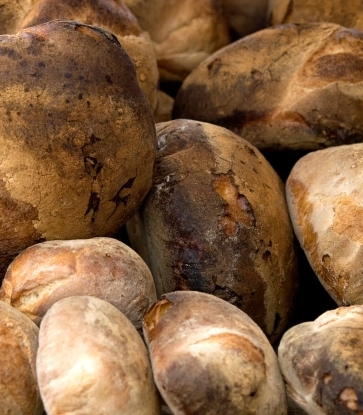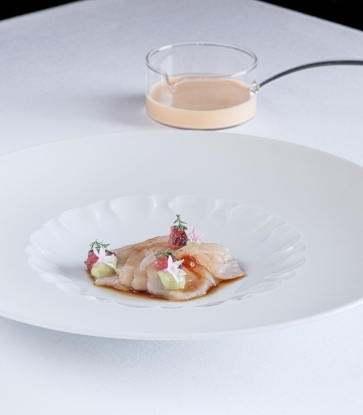Growing up surrounded by the rugged, wild landscapes of Sweden and the Scottish Outer Hebrides, Eoin Smith developed a love for honest, ingredient-led cuisine at an early age. He started a three year apprenticeship at Gleneagles Hotel with stints at Restaurant Andrew Fairlie in The Gleneagles hotel. Eoin Smith worked at double MICHELIN-starred Dinner by Heston Blumenthal in London. His signature style became increasingly refined and sophisticated. He than worked alongside chef Alex Dilling and with chef Simon Rogan at ION Harbour, which holds two MICHELIN stars, he discovered the rich potential of Malta's terroir and merroir. At Rosami, his aim is to further enrich the Maltese culinary landscape with an elegant, rustic style of cuisine.
What primarily influences your cooking style?
"It seems logical to me that, as a chef, you look at what your local environment has to offer in terms of ingredients. And then it's best to look beyond the most obvious ingredients. That's how I found things that I wouldn't have anticipated initially. I am thinking of ducks, deer and also guinea fowl raised on Gozo. It's not just about extraordinary ingredients that allow me to create flavoursome dishes. Highlighting their exceptional quality means acknowledging the work of the producers, which is also gratifying and motivating for them."

How exactly do you know that this gives them a positive boost?
"I get that positive feedback because I regularly go and pick up produce from the farmers myself. I don't see that as just part of my job – I enjoy getting to know these people, their produce and working methods better this way. Meanwhile, they also get to know me as a chef, and I can provide constructive feedback on their produce and work. This kind of interaction creates a stronger connection with them and with the terroir. The same goes for our fish supply, which comes from small-scale fishermen. I've come to know them personally. I know how they work, how dependent they are on the weather and how this directly affects the fresh daily catch we rely on in the kitchen. There is often something unpredictable in that, which is precisely what makes our work in the kitchen exciting and challenging."
"I also look for ingredients that are unique or distinctive and give my cuisine its own identity. I communicate this point during our interactions. An example of this would be the produce of artisan cheesemakers in Malta. Showcasing such cheeses, which are typically unfamiliar to most people, is much more exciting than importing cheeses from abroad. For a chef like myself, working with local artisans who can supply us with exceptional ingredients is a matter of course. Showing this kind of appreciation is part of our job."

Chefs who cultivate such a distinct identity in their cuisine really connect with people. At Rosami, it seems you're not just aiming to forge good relationships with farmers, growers and fishers… The waitstaff are also clearly instructed to elaborate on the produce at the table. What exactly drives this extra level of dedication?
"On the one hand, I think it's natural for our diners to be involved in the process. Our front-of-house team are well aware of our mission to highlight that link between the produce and how it's prepared. That's why they finish off a number of dishes at the table, as a kind of demonstration. This helps them tell the story behind the food and explain how it is made. In this way, they add something extra to the experience and, at the same time, introduce a certain flow in the service that helps create a unique and enjoyable atmosphere, which our diners clearly appreciate."
This approach certainly adds an extra dimension to the dining experience. Some of your dishes are rather understated in the context of the zeitgeist, which makes for a great contrast to the sophisticated flavours they present. Is that intentional?
"I don't like going overboard and, first and foremost, I want to prepare the main ingredient in the most delicious and natural way possible. The main ingredient should always be identifiable as such. Techniques serve the purpose of achieving the desired flavour and keeping the preparation process straightforward. When we overcomplicate a dish, diners often start asking themselves unnecessary questions. I just want to bring a sense of calm and clarity to the table."

Where did you acquire this mindset, or who influenced you in that regard?
"I think I got most of these ideas from home. I was born and raised in Sweden, and a big effort was made in our household to prepare ingredients in the best possible way – simply and with minimum fuss. Take venison or fish. Only a few extra elements would be added in order to maximise the innate flavour of the main ingredient. Later, I moved with my family to Scotland, to the island of Lewis and Harris. There, just like in Sweden, I grew to appreciate produce sourced in the wild, such as game, poultry and seafood, and to treat it with care and respect."
Is that the secret of your exceptional duck dish? It attracts a lot of attention with its finesse, robust flavours and unique texture, and it's this blend of elegance and rustic simplicity that diners love so much.
"As is so often the case in a kitchen, a number of factors come into play. The ducks are raised locally, with great care and on a small scale. I allow the carcasses to age slightly, just long enough for their flavour and texture to fully develop while preserving maximum freshness and succulence. This precise timing and preparation gives the dish a deep, rich taste. I appreciate your describing it as elegant and rustic. It's true that in my cooking I'm looking for a specific balance between what we consider fine dining and a purer form of cuisine that people enjoy because it keeps things natural."

"It's an approach to cooking that suits me well because it was shaped by my upbringing and I have learnt to appreciate it as something very pure and essential. That idea is the foundation upon which I've built my unique style and added a personal touch to my dishes. Of course, your cooking is also influenced by work experience, internships, what you read and learn about ideas and techniques – and by using ingredients from other culinary cultures that help to elevate dishes, give them intensity and distill their essence. A specific example would be the spice blend furikake, and miso koji, which I use to create depth or to underpin a dish. But they are always used sparingly and thoroughly integrated. I'm not creating Japanese-inspired cuisine, but I do use certain elements to refine my dishes, embracing the motto 'act local, think global'."
Your cuisine really does have a unique and sophisticated degree of complexity that is hard to pin down.
"At Rosami, both the kitchen and service team make it their mission to ensure guests have an enjoyable, relaxed and entertaining evening. I know classic French cuisine and use it as the basis for my cooking. I have an equal amount of respect for Maltese cuisine and make use of the ingredients that help give it its character and flavour. But I don't cook French or Maltese cuisine exclusively. I offer dishes in which I can showcase local produce by drawing on these two cuisines and incorporating international seasonings. That's the objective and it's an ongoing work in progress. It is also a team effort in which local people and the surrounding land and sea play an important role. That connection with them and what the islands produce is key. That's a bond that motivates us and is a driving force both for our suppliers and for us to keep doing better and better. And to provide our guests with a unique experience that can only be found at Rosami."
















